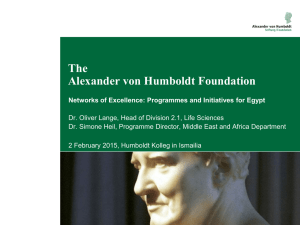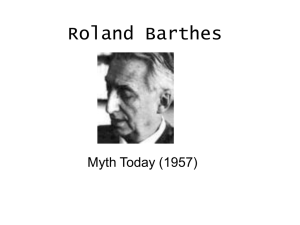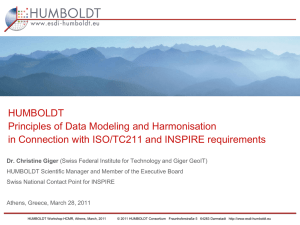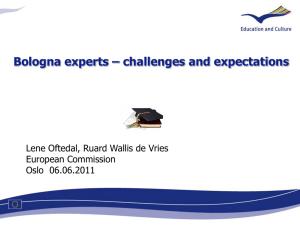The Humboldt Myth and the Bologna Process
advertisement
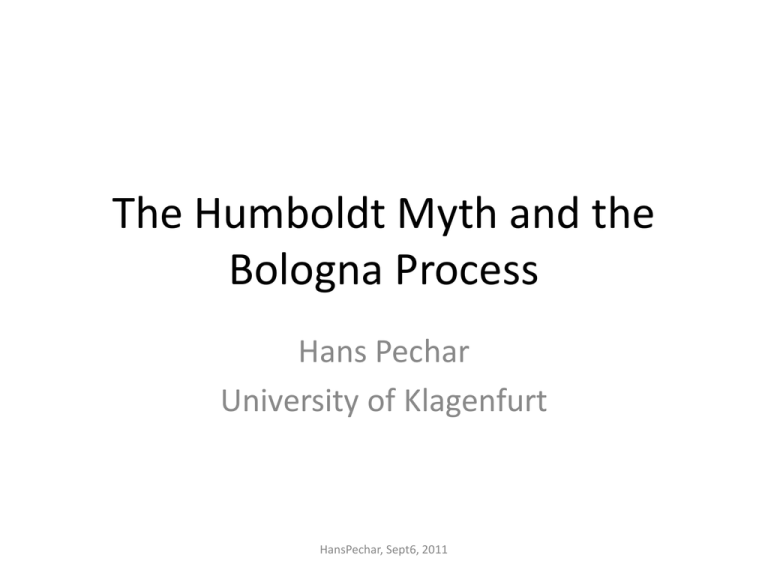
The Humboldt Myth and the
Bologna Process
Hans Pechar
University of Klagenfurt
HansPechar, Sept6, 2011
This photo was used across the front pages of most of the national
newspapers following the student protest. (London, Nov 2010)
HansPechar, Sept6, 2011
Milano, 2010
HansPechar, Sept6, 2011
Madrid, 2011
HansPechar, Sept6, 2011
45% youth unemployment rate in Spain
HansPechar, Sept6, 2011
Greek Response To A 'Balanced Budget'
HansPechar, Sept6, 2011
HansPechar, Sept6, 2011
HansPechar, Sept6, 2011
HansPechar, Sept6, 2011
HansPechar, Sept6, 2011
The Basic Argument
• 3 waves of “Humboldt myth“ – defence against
modernization of HE
• early 1900s: “Invention“ of Humboldt
• Fritz Ringer – Decline of German Mandarins (1890 – 1933)
• The Mandarins after 1945
• late 1900s: 3rd wave – Humboldt vs Bologna
• protect Humboldt against his mythologists
HansPechar, Sept6, 2011
1808/09: Prussian Minister of
Education
Plan for reforming the Prussian
education system:
Über die innere und äußere
Organisation der höheren
wissenschaftlichen Anstalten in
Berlin ('On the internal and
external organization of higher
academic institutions in Berlin').
Not published and unknown,
rediscovered and first published in
1903, triggered 1st wave of
Humboldt myth
HansPechar, Sept6, 2011
Germanic Education – Basic Facts
• early streaming (age 10): Gymnasium vs “main school”
• graduates of Gymnasium entitled to enroll at university
– no admission
• before Bologna: No undergraduate courses
• before 1960s: Doctorate = 1st degree
• before governance reform: no university management;
Rector = figurehead
HansPechar, Sept6, 2011
The Ringer Story
German exceptionalism: The social standing of the educated middle
classes
• historic window of opportunity
• ideology of cultivation (Bildung)
• sociological concepts (class vs status)
Rise and decline of Mandarins
• socially progressive concept (early/mid 1800s)
• reactionary ideology (from late 1800s)
HansPechar, Sept6, 2011
Historic Window of Opportunity
Intermediate stage of economic development
• landed aristocracy in defense, the commercial middle
classes not yet strong
Prussia humiliated by Napoleon
“The physical power that the Prussian state has lost must
be replaced by spiritual power”
Hope of salvation is attached to the Germanic notion of
Bildung
HansPechar, Sept6, 2011
HansPechar, Sept6, 2011
HansPechar, Sept6, 2011
HansPechar, Sept6, 2011
HansPechar, Sept6, 2011
HansPechar, Sept6, 2011
HansPechar, Sept6, 2011
HansPechar, Sept6, 2011
HansPechar, Sept6, 2011
HansPechar, Sept6, 2011
HansPechar, Sept6, 2011
HansPechar, Sept6, 2011
HansPechar, Sept6, 2011
Ideology of Cultivation (Bildung)
Pure, impractical learning as end in itself
Inner growth
• roots in Pietism, quasireligious belief system (sons of
Protestant pastors become secular intellectuals)
Anti-utilitarianism: claim of a leisure elite, exempted from
manual work, responsible to govern society (functional
ruling class)
HansPechar, Sept6, 2011
Sociological Concepts (Class vs Status)
Max Weber
Distinction class vs status (social estate)
Class: objective positions in system of production
Status: attributed social honor associated with certain
styles of life (similar to habitus)
Non-utilitarian cultivation emphasizes the status
dimension
HansPechar, Sept6, 2011
Max Weber
“Differences of education are one of the
strongest social barriers, especially in Germany,
where almost all privileged positions inside and
outside the civil service are tied to qualifications
involving not only specialized knowledge but
also ‘general cultivation’ and where the whole
school and university system has been put into
the service of this ideal of general cultivation.”
HansPechar, Sept6, 2011
Friedrich Paulsen
“The academically educated constitute a kind of
intellectual and spiritual aristocracy .... Together,
the make up a homogeneous segment of
society; they simply recognize each other as
social equals on the bases of their academic
cultivation ... Conversely, anyone in Germany
who has no academic education lacks something
which wealth and high birth cannot fully
replace.”
HansPechar, Sept6, 2011
Friedrich Paulsen
“Educated and uneducated, these are the two
halves into which society is at present divided.
They have gradually caused older divisions to be
forgotten.”
HansPechar, Sept6, 2011
Rise: Formative Era
1848
Revolution
Napoleonic
Wars
1890s
1918
Weimer
1933
1945
1968
1990s
HansPechar, Sept6, 2011
Rise: Formative Era
• modernization: feudal estates based on birth
displaced by social estates based on vocation
• neo-humanist emphasis on Bildung:
meritocratic challenge to privilege of birth
• emancipatory educational ideals, socially
inclusive
HansPechar, Sept6, 2011
Mandarins at their Peak
1848
Revolution
1890s
1918
Weimer
1933
1945
1968
1990s
Napoleonic
Wars
HansPechar, Sept6, 2011
Mandarins at their Peak
• represent political interest of the rising bourgeois
society (e.g. Revolution of 1848)
• cultural hegemony
• German research university becomes global role
model
• but disciplinary specialization violated neohumanist principles
HansPechar, Sept6, 2011
Decline: Age of Masses
1848
Revolution
Napoleonic
Wars
1890s
1918
Weimer
1933
1.
Humboldt
Myth
HansPechar, Sept6, 2011
1945
1968
1990s
Decline: Age of Masses
Rapid economic development,
commercial + working classes strengthened, cultivated class
squeezed, hegemony threatened
Rise of modern/technical HE
“Cultural crisis”
•
soulless modernity, over- specialization, utilitarian research
Regressive anti-modernism & anti-capitalism
• German culture vs Western civilization
HansPechar, Sept6, 2011
Invention of Humboldt
• no reference to Humboldt during the 19th
century (only little to neo-humanist concepts
of higher learning)
• discovery of Humboldt‘s manuscript triggers
1st wave of Humboldt myth
• return to Humboldt: rebirth of a nation,
solution of cultural crisis
HansPechar, Sept6, 2011
Decline: Weimar Republic
1848
Revolution
Napoleonic
Wars
1890s
1918
Weimer
1933
1. Humboldt
Myth
1945
1968
1990s
HansPechar, Sept6, 2011
Decline: Weimar Republic
Downward mobility
Hyper inflation
• salaries higher officials/workers: pre-war 7:1, after war 2:1; fiscal
austerity threatens universities
Delegitimize the democratic government, increasing right-wing
orientation
“The difference between the intellectual elite of Germany and the
extremist right-wing intellectuals was largely a matter of style and
tone” (Habermas)
HansPechar, Sept6, 2011
Ringer Story Continued
1945 2nd Humboldt myth – restoration of the
old academic regime
1968 Mass culture and mass higher education
arrives in the Germanic countries
1990s 3rd wave of Humboldt myth against
governance reforms and Bologna process
HansPechar, Sept6, 2011
1945: Restoration of Old Regime
1848
Revolution
Napoleonic
Wars
1890s
1918
Weimer
1933
1. Humboldt
Myth
1945
1968
2.
Humboldt
Myth
HansPechar, Sept6, 2011
1990s
1945: Restoration of Old Regime
• Mandarins repel US demands to democratize education
2nd Humboldtian myth
“healthy in its core”
• facilitated return to the old regime of neo-humanist Mandarin
hegemony
• economic and political integration of Germany & Austria into
Western Hemisphere;
• mass consumption accepted, mass culture devalued ( comics =
trash literature, jazz = “negro” music)
HansPechar, Sept6, 2011
1968: Mass Culture Takes Off
1848
Revolution
Napoleonic
Wars
1890s
1918
Weimer
1933
1. Humboldt
Myth
1945
1968
2. Humboldt
Myth
1990s
mass
university
HansPechar, Sept6, 2011
1968: Mass Culture Takes Off
Cultural Revolution
• mass culture and mass higher education becomes accepted
Habermas (1971): Mandarins disappeared
Educated middle classes still powerful: avoided structural reforms
• no comprehensive school, expansion of Gymnasium
• neo-humanist façade provides excuses for ignoring the realities
of mass HE
HansPechar, Sept6, 2011
1990s: NPM & Bologna
1848
Revolution
Napoleonic
Wars
1890s
1918
Weimer
1933
1. Humboldt
Myth
1945
1968
2. Humboldt
Myth
1990s
mass
university
HansPechar, Sept6, 2011
NPM,
Bologna
3.
Humboldt
Myth
1990s: NPM & Bologna
• since 1960s gov‘t stressed economic relevance of HE, but
did not interfere into governance and internal academic
affairs
• NPM ends the concept of “cultural state”
(benevolent sponsor, attaching no conditions)
• Bologna introduces a new culture of teaching and learning
ending the laissez-faire practice
• last combat of “Humboldt warriors” to maintain the neohumanist façade
HansPechar, Sept6, 2011
Cultural State vs NPM
Dual nature of university
State agency + autonomous corporation
•
External affairs: micromanaged by ministry
•
Internal affairs: governance of academic oligarchy
NMP
•
Governance similar to North American public universities
Critics
•
privatization, commercialization
HansPechar, Sept6, 2011
Laissez-Faire vs Bologna
Laissez-faire Culture
Academics
•
teach only boutique courses (their research topics), no coherent syllabus
Students
•
must register, but no enrollment and completion monitoring
Never applied to professional/technical studies
Bologna
• 2-tier structure, workload, credits, prerequisites
Critics
• Cultivation sacrificed to economic demands (employability)
HansPechar, Sept6, 2011
Future Prospects?
• Bologna has reached a point of no return;
teething troubles will be tackled
• unlikely that the neo-humanist façade will
survive
• more noise to be expected, but protest is
voice of an outspoken minority, most
academics and students have no strong views
HansPechar, Sept6, 2011
HansPechar, Sept6, 2011
Further Reading
•
•
•
•
•
•
•
•
•
Ash, M.G. (2006), Bachelor of what, master of whom? The Humboldt myth and
historical transformations of higher education in German-speaking Europe and the US.
European Journal of Education, 41(2), 245-267.
Habermas, J. (1971), The intellectual and social background of the German university
crisis, Minerva 9, 422-28
Michelsen, S. (2010), Humboldt Meets Bologna, Higher Education Policy, 23, 151–172
O'Boyle, L. (1983), Learning for Its Own Sake: The German University as NineteenthCentury Model, Comparative Studies in Society and History, Vol. 25, No. 1 pp. 3-25
Paletschek, S. (2001), The Invention of Humboldt and the Impact of National Socialism.
The German University Idea in the First Half of the Twentieth Century, in: Margit
Szöllösi-Janze (Hrsg.): Science in the Third Reich. Oxford: Berg, 37-58
Pritchard, R. (2006), Trends in the restructuring of German universities, Comparative
Education Review 50(1): 90–112.
Ringer, F. (1969), The Decline of the German Mandarins. The German Academic
Community 1890–1933, Cambridge, Harvard UP
Ringer, F. (1986), Differences and Cross-National Similarities among Mandarins,
Comparative Studies in Society and History, Vol. 28, 145-164
Schimank, U. (2005), New Public Management’ and the Academic Profession:
Reflections on the German Situation, Minerva, 43, 361-376
HansPechar, Sept6, 2011


